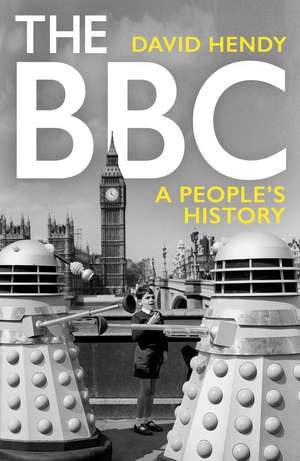The BBC: A People's History
Autor David Hendyen Limba Engleză Paperback – 5 oct 2022
Preț: 73.86 lei
Preț vechi: 85.21 lei
-13% Nou
14.13€ • 15.35$ • 11.87£
Carte disponibilă
Livrare economică 01-15 aprilie
Livrare express 18-22 martie pentru 42.76 lei
Specificații
ISBN-10: 1781255261
Pagini: 656
Ilustrații: Plates
Dimensiuni: 130 x 198 x 48 mm
Greutate: 0.52 kg
Ediția:Main
Editura: Profile
Colecția Profile Books
Locul publicării:London, United Kingdom
Notă biografică
David Hendy is a writer, broadcaster and Emeritus Professor of Media and Cultural History at the University of Sussex. His books include Life on Air: A History of Radio Four, which won the Longmans-History Today Book of the Year Award and was nominated for the Orwell Prize.
Recenzii
A tale of creative endeavour and technological innovation, beset by a constant tension between leading and following the audience
A superb account ... David Hendy stages a cast of brilliant and sometimes flawed characters in a page-turning narrative. Quite simply wonderful
A dramatic tale of innovation and determination ... at the dawning of what would turn out to be this country's biggest and most significant cultural institution
Extraordinary ... Hendy's stated aim is a kind of history from below: a counterpoint to Asa Briggs's magisterial five-volume account of British broadcasting history to 1974, which occasionally gave the impression that the story of radio and TV consisted largely in calm, besuited bigwigs gliding through boardrooms and Whitehall, setting policies and initiating parliamentary committees. Hendy, rather, wants to give a place to the people who actually did the work ... At times, Hendy succeeds magnificently
A fascinating and informative account of the BBC's first 100 years
Hendy ... combines a historian's sense of sweep with the eye for colour of the TV producer he once was
David Hendy's history of the BBC is both engaging and fair ... it is very much the case for the corporation, but it is a case that needs to be made
A solid ... case for the BBC's survival
Lucid and well-researched
Hendy tracks the Beeb from its chaotic formation and its pivotal, sometimes covert, roles during the Second World War through peaks and troughs ... packed [with] vivid tales
Sympathetic but never uncritical, a masterpiece of lucid presentation ... this is the authoritative, much-needed history of the BBC's first century - a century at the heart of British everyday life. I hope it does its bit to counter the vandals
David Hendy's magisterial The BBC: A People's History is a truly wonderful book. Captivating, compelling, moving, and richly detailed it is both a ground-breaking and important history of our national broadcaster and one of the best things I have read on the transformation of British society, culture, and politics since the 1920s
An appropriately large-scale account of the media giant at the very heart of British life ... Much of this history has been told before but never in such well-researched depth and sparkling detail
Descriere
'Thorough and engaging ... you can't understand England without understanding the BBC' New York Times'Fascinating and informative' Daily Telegraph'A dramatic tale of innovation and determination' GuardianIn 1922, a tiny group of men and women came together to found the BBC, using what had been a weapon of war - Marconi's wireless - to remake culture for the good of humanity. Twenty years later, when George Orwell famously quit the Corporation, he decided he was done 'doing work that produces no result'. Yet the BBC is now one of Britain's most beloved institutions. Stars once fainted at the microphone; now a select few spend their Saturdays waltzing for the nation's entertainment in front of studio cameras. From Daleks to Desert Island Discs, the BBC has blazed a trail for British entertainment. Yet it has also always been at the forefront of global change, both breaking and covering the most important stories of the century on Panorama and BBC News. This is a stirring and monumental history of the British cultural stalwart which created modern broadcasting one hundred years ago.




